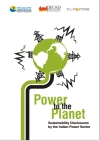Reports
Power to the Planet – Sustainability Disclosures by the Indian Power Sector is a study that examines the major power sector companies in India to understand their communication of commitment towards sustainability matters. Traditional power companies, particularly thermal power plants (whose share in the energy mix in India is more than 57%), are among the highest consumers of finite and non-renewable resources which calls for higher demonstration of commitment towards sustainability reporting. The study found that very few power companies in India report on sustainability matters in any form, particularly dedicated sustainability reports. Accordingly, this analysis focused on information contained in annual reports and websites of the companies in the sample and information put out by the Ministry of Power. It also looked at the gainful utilisation of fly ash, a by-product of thermal power plants which is a significant source of air and water pollution.
The study has analysed the preparedness of power sector companies in submitting Business Responsibility Reports for compliance with SEBI’s new clause 55 and finds that there is still a long way to go for these companies as the quality of disclosures that do exist requires substantial improvement.
Sustainability reporting practices of the top ten global utilities companies (as per Forbes magazine’s Global 2000 list) were also studied to get a sense of the major concerns, risks and opportunities identified by them and the extent of reporting. The study revealed that globally, like in India, thermal power (coal and gas) constitutes the largest share of the energy mix, although unlike India nuclear energy has the second largest share. Sustainability reporting among global power utilities is more robust with several companies using established global frameworks and addressing specific sustainability issues.

Books
CSR in India Steering Business toward Social Change

For too long CSR in India had been left to non-directional, haphazard do-gooding; 'Governance' - the process through which decisions are taken - of CS
![]() The sustainability revolution will, hopefully, be the third major social and economic turning point in human history, following the Neolithic Revolution - moving from hunter-gathering to farming - and the Industrial Revolution
The sustainability revolution will, hopefully, be the third major social and economic turning point in human history, following the Neolithic Revolution - moving from hunter-gathering to farming - and the Industrial Revolution
HRH Prince Charles (2009)

